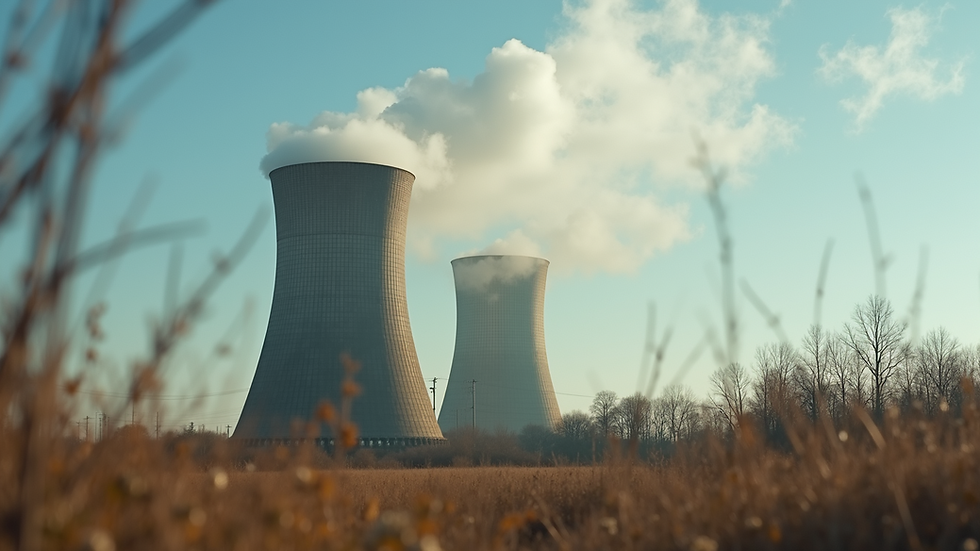9 Nuclear Energy Myths
- get into nuclear
- Jul 26, 2017
- 3 min read
Updated: Dec 2, 2022


1 - The economics; it is believed that renewable energy is a much cheaper option in the long run. However, the technology does not exist and there is much investment needed to get there. It could be argued that you should use this investment to better the nuclear energy, disposal and decommissioning processes that are already in existence.
2 - Nuclear safety; it is often argued that nuclear is the most affordable long-term energy option going forward. However, this comment is usually followed up by the argument that it is not the safest solution. This is not true in the main. The likes of the Chernobyl or Fukushima disaster are being reference here. Chernobyl has been proven to be down to poor design and mis-management and Fukushima was hit with a 42-foot tsunami. Recent reactors are designed to be able to withstand earthquakes and tsunamis, attacked by an aeroplane or missile and account for critical mistakes by operators.

3 - Other countries are turning their back on nuclear; There are currently over 400 nuclear reactors in operation producing around 11% of the world's electricity. More than 60 are under construction and 158 are planned to be built. Countries that use nuclear power include; China, the USA, Russia, France, Canada, and Brazil. Nuclear currently produces 20% of our electricity in the UK and the plans in place to maintain this capacity.
4 - Local residents receive an increase in radiation; Any direct radiation from a nuclear power plant will be blocked by the station's purpose-built steel and concrete structures. These safety barriers mean people living near a number of power stations will not receive a higher dose than any other community. Actually, in some areas in the country, such as Cornwall, residents will receive a background dose of 7.8 mSv, compared to the national average of 1.3.mSv. This is indigenous granite, which contains elements of uranium.
5 - Nuclear isn't low carbon; nuclear energy is a low source of electricity generation. it is essentially carbon-free and no carbon dioxide is produced during its operation. Nuclear power in the UK avoids the emissions of 49 million tonnes of CO2 every year, the equivalent of taking 78% of Britain's cars off the road.

6 - Environmental impact; it is widely argued that nuclear waste and spent fuel are environmental hazards and a reason to not pursue the nuclear energy electricity generation option. However, all energy sources have an environmental impact. The production of solar panels as an example emits toxic chemicals as by-products and the panels themselves are non-biodegradable. Of course, radioactive waste needs to be disposed of and work is ongoing to review and improve this process.
7- Nuclear Power Plants are terrorist targets; almost since the start, the UK nuclear industry has been aware of the threat of terrorism. All nuclear sites in the UK are guarded by the Civil Nuclear Constabulary (CNC) and all workers are thoroughly vetted before entering the site. The design criteria for NNPs mitigates the threat of terrorism and the structure stations are not only built to contain any threat. Tests have been carried out to understand the resilience of nuclear reactors again the threat of munitions, large commercial aircraft and a number of other threats.

8 - Nuclear Power Stations are susceptible to cyber-attacks; it is impossible to cyber-attack any reactor protection system as they are not digital and have a safe shut down mechanism when faced with a control problem. All of these safety control systems are independently regulated and operated on a nuclear licenced site.
9 - Nuclear waste takes years to decay; Every radioactive material naturally decays over time and has a finite radiotoxic lifetime. More importantly, less than 3% of the total waste produced by the civil nuclear industry in the UK is highly radioactive and requires isolation. The main radioactive nuclear waste remains active for tens of years and can be safely disposed of in near-surface facilities. It poses no risk to the environment or human health.
Credits:










Comments